Things may be coming to a head in the politics over the Western Wall in Jerusalem, writes Shalom Lipner: In December, an ultra-Orthodox partner to the Netanyahu government tabled a bill that would make the performance of progressive Jewish ritual at the Wall a felony. Now there is a frenzy over the fallout, with all sides hyper-agitated. This piece originally appeared in the Times of Israel.
With all due respect to Mexico, there’s another wall back in the news these days. Not back in the news actually, but still there. Constructed around 2,000 years ago as a retaining wall for an expanded Temple Mount, the Western Wall continues to attract throngs as the proxy for Judaism’s holiest site which once stood atop it. And true to the old adage about three opinions for every two Jews, the no-holds-barred power struggle over norms of behavior at the compound rages on without pause.
Today, the Wall functions doubly as a home to both supplicants and patriots—the former come to beseech Divine mercy, the latter to witness Israeli national commemorations—but the louder fireworks are the religiously tinted ones. Governing in accordance with prevailing Orthodox custom, local administrators enforce gender segregation and restrict the participation of women, infuriating Jews who entertain other standards of practice. This ideological clash is responsible for the macabre circus that comes to town when police are frequently summoned to mediate between warring factions. One can be forgiven for wondering what God must think of his Chosen People when its womenfolk are arrested for the crime of smuggling Torah scrolls into prayer services.
Worthy of its status as a flaming hot potato, the issue has been bandied about for decades. The script is already familiar: In the first act, Reform, Conservative, and feminist Jews appeal to the courts for their civil rights to be respected at the Wall, compelling the justices to instruct that the state and its legislature broker an appropriate compromise. Then, in Act Two, when a combination of procrastination, political wrangling, rabbinic homily and an overall incapacity (and lack of courage) to make decisions produces little except gridlock, the courts are again called upon to rule. This routine has been reprised, seemingly ad infinitum, invoking shades of Bill Murray in Groundhog Day. But things may be coming to a head.
In December, Shas, an ultra-Orthodox partner to the Netanyahu government, tabled a bill that would make the performance of progressive Jewish ritual at the Wall an actual felony. With champions of the relationship between Jews in Israel and their Diaspora cousins—and of the directly impacted U.S.-Israel alliance—in a complete frenzy over the fallout, all sides are hyper-agitated.
* * *
My own engagement with this dispute goes back a long while. Worn out from many years of futile bickering, I was energized suddenly by a potential inflection point in early 2010. Writing in the Jerusalem Post, Rabbi Barry Schlesinger, then president of the Rabbinical Assembly of Israel, an affiliate of Conservative Judaism, proposed that his flock promote an attainable outcome instead of a utopian one. Inspired by his charge to “look for a solution that promises no confrontation with those praying at the Wall, and a maximum of dignity, inspiration and spirituality for all,” I was gratified to get clearance to open a channel for dialogue with Rabbi Schlesinger.
Both he and I later moved on to other positions, but stayed connected to the process we had initiated. In fact, it had grown to take on a much larger life, expanding to eventually attract the personal involvement of Prime Minister Netanyahu, successive cabinet secretaries, the heads of the liberal streams of Judaism and other high-level intermediaries. What had first begun to emerge in my 2010 discussions—namely, the allocation of a separate space at the Western Wall’s southern end for pluralistic worship—endured as the defining paradigm for a resolution of the stand-off. The first tangible marker of headway appeared In August 2013, when the proverbial ribbon was cut at Ezrat Yisrael, a raised platform adjacent to Robinson’s Arch, a parallel section along the exact same Wall that would host egalitarian observances.
A more comprehensive resolution remained elusive, however. The two primary demands of the Reform and Conservative leaders were an infrastructure upgrade (that would put the “new” Wall on an equal footing with the original) and a governance arrangement that inserted sympathetic directors in place of the stringent Western Wall Heritage Foundation. The first matter was a virtual no-brainer, and the government readily acceded to the condition. The management piece was stickier, meeting pockets of resistance to any measure that smacked of formal recognition for hitherto unsanctioned (a.k.a. not Orthodox) branches of Judaism.
But the parties kept at it. The Women of the Wall, a group fighting for the right to conduct women-only services at the traditional Western Wall, splintered with many of its members signing off on the Robinson’s Arch program. And in January 2016, the Israeli government approved the scheme, paving the way forward for a cooperative approach to calm intra-Jewish tensions. But the victory was short-lived: when news of the historic deal broke in the ultra-Orthodox media, the community’s deputies were forced to retract their tacit acquiescence to its terms. The prime minister then suspended the agreement and reentered negotiations with the dissenting constituents of his government.
In the current state of play, well-placed sources in the ultra-Orthodox blogosphere—yes, there is such a thing—intimated that the holdouts would float the possibility of resigned acceptance to the alternative Wall, but without any official role for liberal Jewry in its administration. Then, over the weekend, they did an about-face, forming a coalition with the chief rabbis and the national religious agriculture minister to demand that last year’s government resolution be altogether repealed. But this is all beside the point, as the bad blood flows unrelentingly.
* * *
“I disapprove of what you say, but I will defend to the death your right to say it.” It doesn’t matter whether Voltaire actually said it or not. And maybe the “to the death” part is just a tad extreme. But this is the celebrated creed of liberal democracies, in whose company Israel counts itself. Personal preferences and comfort zones have scant currency in this realm. The only relevant questions should be what kind of country Israel wants to be when it grows up, and how this interest is best served.
In its heart, Israel aspires to be an open society, ascribing to the highest ideals of freedom and liberty for all law-abiding persons. But the vision thing has a tendency to get lost in the exhausting slog of operating a national project in a singularly hostile neighborhood. So it’s time for a reality check: Membership has its obligations too. When Israel shows a lack of tolerance for the religious expression of its fellow Jews, it undermines its own integrity. Its standing to criticize other regimes for their treatment of Jews is impaired if its own actions are similarly dubious. For Netanyahu to then claim the mantle of “representative of the entire Jewish people” speaks to a credibility problem.
One thing Israelis do understand though is instrumentality—and the ground is no less shaky here. When the State of Israel disrespects the spiritual outlets of its greatest benefactors, it shoots itself in the foot. It would seem patently foolish to expect that American advocates and patrons of the Jewish state will continue their efforts on its behalf if repaid with the rejection of their core identity as Jews; maybe this generation will, but it won’t last forever. Not to mention the fact that this is the same well from which the Israeli government hopes to draw buckets of educated future immigrants. If Orthodox and non-Orthodox Jews can find ways to coexist productively in the Diaspora, it shouldn’t be impossible to reach a modus vivendi in Israel either.
Finally, the Trump card. It’s plausible that some Israeli decisionmakers have made the following calculus: Since liberal American Jews didn’t vote for Donald Trump, their views will have negligible influence on U.S. foreign policy— ergo there’s no practical necessity to accommodate their feelings, certainly not if they entail the risk of a coalition crisis in Jerusalem. But it would be complete folly to undertake such a perilous and short-sighted strategy. No one should forget that Jewish Republicans are far from all Orthodox and that, election results notwithstanding, Democratic Jewish titans of industry and academia will maintain plenty of leverage over the coming four years. Moreover, it should go without saying that nothing is forever—translation: When the political pendulum eventually swings back in the other direction, does Israel really want to have totally alienated its friends within the Democratic Party? (This has implications for Israel well beyond inside Jewish baseball.)
Change on this issue will not come easily. It won’t be linear either. Demographically, Israel’s Jewish community is skewing more politically conservative and traditional—and since Israel, like the United States, is a robust democracy, this voting majority merits a strong voice in shaping the public domain. This places a heavy onus on the Reform and Conservative movements whose best and most convincing case has gained limited traction in the domestic discourse.
The fifth chapter of Pirkei Avot (Ethics of the Fathers) recounts the miracles associated with the Temple, one of them being that no pilgrim ever had to say “my lodging in Jerusalem is too cramped for me.” That message resonates poignantly today. Sadly, the discord generated by the Wall feud is infectious and indicative of a deeper fault line that traverses the broader intersection of religion and state in Israel. Cooler heads need to prevail so that the Kotel can fulfill its mission as a unifying force for world Jewry. This wall needs to bring people together not separate between them.
The Brookings Institution is committed to quality, independence, and impact.
We are supported by a diverse array of funders. In line with our values and policies, each Brookings publication represents the sole views of its author(s).



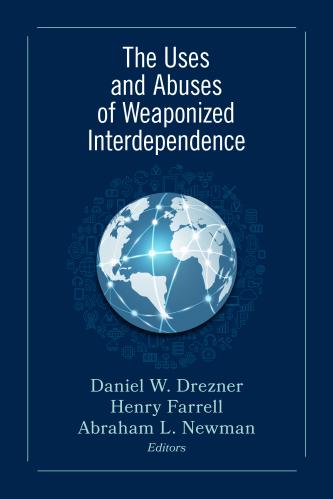
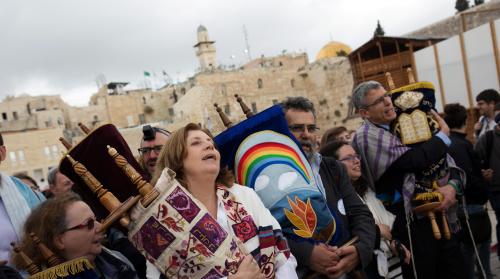
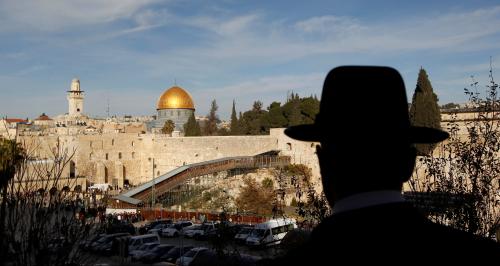
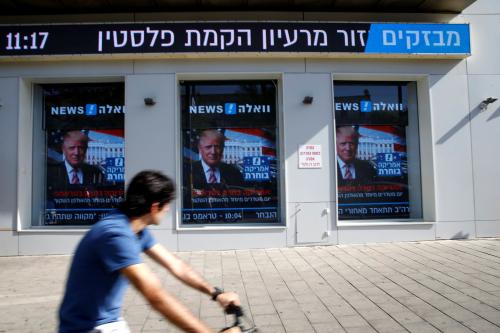
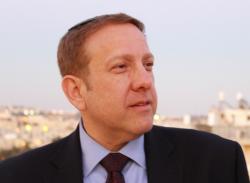
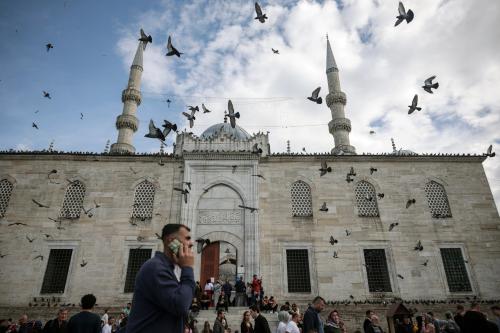

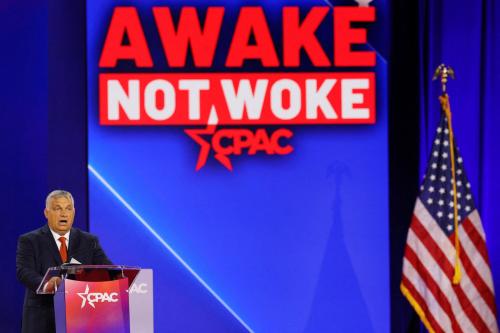
Commentary
Israel, Trump, and the (other) wall
February 13, 2017